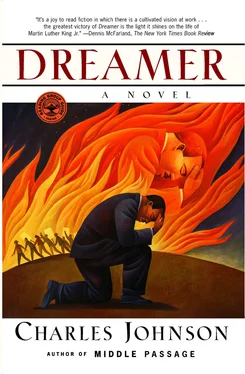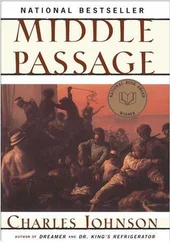As Abernathy dozed, he went back to the television, turning the volume down low, on his face the flickering television’s glow as the full-scale riot raged on. Transfixed, unable to turn away from the violence, he remembered how he’d turned James Lawson’s request to address a Memphis rally over and over in his mind. The timing seemed wrong. He was in the midst of raising money for the proposed three-month spring offensive for the poor, an assault that would force Congress to directly confront economic injustice in America and realize a dream long nurtured by predecessors such as A. Philip Randolph. But how could he turn away from this other just cause? These black sanitation workers needed a nationally visible champion. Earlier in the year two black crewmen were crushed in a grisly accident caused by a garbage truck’s compressor. In early February sewer workers were sent home for a day because of bad weather, but while whites received a full day’s wage, the blacks were only paid for two hours. The injustices in Memphis were clear, for, as Marx might put it, the sanitation workers provided “socially necessary labor” without which the city would smother in its own sludge. Yet despite the value of their work, these men, who tramped every day down hot alleyways with the filth of the affluent packed in plastic tubs on their backs, and swept away rats and maggots and the stench of so-called civilized life so the wealthy could move about in clean homes and bright workplaces — these invisible men in Memphis, whose clothes were perpetually scented with the waste of others, were denied the most basic forms of decency. Their situation perfectly mirrored the point he wanted to drive home with the Poor People’s Campaign. One of his aides jokingly remarked that he was always operating two steps ahead of where he actually was. Perhaps, the aide suggested, he needed to get over his inability to say no to anyone in need, a comment he brushed aside, pointing out that his tour of Mississippi would bring him near Memphis, and once there he would carefully test the waters to see how deep he should dive in.
It so happened that the waters in Memphis were pleasantly warm and felt just fine. On March 18, he spoke to an enthusiastic crowd of nearly seventeen thousand that hung on his every word as he told them to put aside their class differences and join ranks behind the striking garbagemen, whom he called “as significant as the physician, for if he doesn’t work, disease is rampant.” For every sentence he sang, the crowd sang back, That’s right! and Hallelujah! They stamped their feet, they cheered, and he got into the swing of it, strengthened by their energy, at one with their hopes and dreams of dignity. The injunction wouldn’t stop them, he said. Nothing would turn them around because they were tired, so tired, from working day and night and never seeing a living wage. Their men were sick of having their manhood denied, their wives and daughters of being domestic servants. The crowd rocked to his preaching that Monday night, roared its approval. And why not? This was Tennessee and he was a son of the South. There were no nationalists here. The Black Power plague hadn’t infected Memphis, not like in Chicago. He was home again. He understood these good, Galilean people. He was of them, and they were happily in the palm of his hand, just as in Birmingham and Montgomery. Lord have mercy! This was what he’d needed for so long, and in that giddy, feel-good moment he made them a promise. If they marched together on Friday, if every working man and woman joined in, and the children too, then they would win. And he promised himself he would lead them.
It should have been a triumphant march, an exuberant overture, or trial run for the Poor People’s Campaign. The problems began when his flight from New York to Memphis was late by two hours. The parade started without him. A little before noon Abernathy met him at the airport and hurried him to the Clayborn Temple; then he was rushed by car toward the front of six thousand restless, edgy Tennesseans already on the move. In the backseat, peering out, he realized something was very wrong. This wasn’t a line of protesters. It felt more like an undisciplined mob. Toward its end he saw young people holding up placards that read “Black Power Is Here.” They were the Invaders, his driver said. None of them cared for his message of nonviolence — they were disciples of Stokely and Rap Brown — and they had threatened to disrupt the march if they were not included. Fact was, they’d been a problem since the Memphis strike began. “And you didn’t tell me?” he asked, grabbing the front seat and pulling himself forward, which jostled his driver. Great Peter only knew why they’d held back this information. He struck the seat and his driver jumped, hunching his shoulders, bringing the car to a stop. Up ahead, the police were closing off Main Street. It was too late to turn back. Whithersoever he went he knew he would find them, the violent in spirit, the herren-moralists, the Nietzscheans. Turning the door handle, lifting himself out of the car, he silently said a prayer, knowing that men of conviction had to act, though always on the basis of partial information, blindly forging ahead and hoping for the best. The word for this from time immemorial, he knew, was faith.
Which lasted all of three blocks, then died in downtown Memphis. Most of the marchers returned home or to their churches. But the Invaders, who had used the march as a cover, fought on, firing at the police, turning over cars, setting fires and smashing store windows.
He was still watching the news reports when Abernathy padded sleepily from the bedroom. His friend of sixteen years plopped down beside him on the sofa, yawning and knuckling his red-rimmed eyes. Always his nearness was bracing. As friends they had the habit of each other, like siblings, and he could talk candidly with him. They complemented and in many ways completed each other, though he knew that from their first meeting in Montgomery Abernathy had, in his own words, burned with envy at his big-city learning and confidence.
“Do you good to get some sleep, ML,” Abernathy said. “Things out there have to settle down sooner or later.”
“Maybe they shouldn’t.”
“What?”
“If we believe in peace, maybe we should get out of the way and let the separatists and segregationists, the Invaders and racists, black anti-Semites and Klansmen, go at each other in a full-scale war.” He coughed, his voice slipping a scale. “They’re two of a kind. Just different in color. I can’t believe they’ll ever change. Hate is too easy. Nonviolence as a way of life may be asking too much of people. Maybe it goes against the grain of something tribal in our genes. Or against the ego. Or the carnal mind, which can only perceive in terms of polarities. If I have to choose between seeing men as fallen angels or risen apes, I prefer the former. You know that. But the apes, black and white, are out there. And their goal is to make the world a jungle. I say, let them kill each other and tear it all down, then God-hungry men and women can make a fresh start.”
“You don’t mean that …”
“I do.”
“I think you’re just tired.”
“Yes, I am. And I think it’s over, Ralph.”
“No, that’s just—”
“Let me finish. I’m not saying we haven’t accomplished a great deal. We have. But where can I go from here? After this? Can I keep developing? What can I do? God, I haven’t read a book in years! These reporters ask me about the Tet offensive, the Middle East, the Kerner Commission report, and I haven’t had one blessed hour to study any of it in depth, but I’m expected to keep on giving speeches, so I do, making it up as I go along. That’s shallow. It’s skating along the surface when I need to go deeper into things. Into myself, if I’m going to give back anything of value. I feel trapped, like I’m stuck in a hole. I remember from Crozer, in a paper I wrote, that’s what the word suffering means in Sanskrit: Dukkha. ‘Duk,’ bad, ‘kah,’ hole.” He let his breath roll out. “What I’m trying to say is that if every day doesn’t add knowledge, wisdom, and the ability to live life and increase our capacity to love, we are already dead. Does that make any sense?”
Читать дальше












